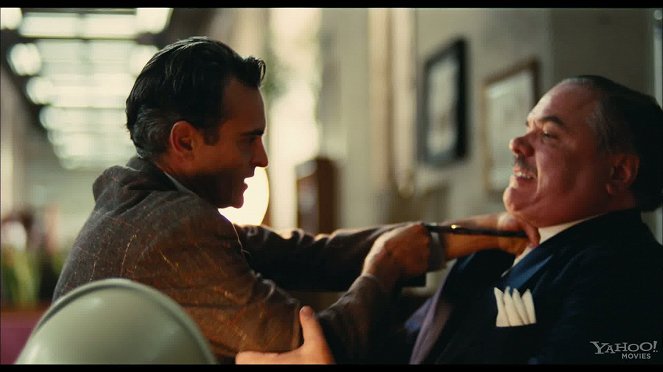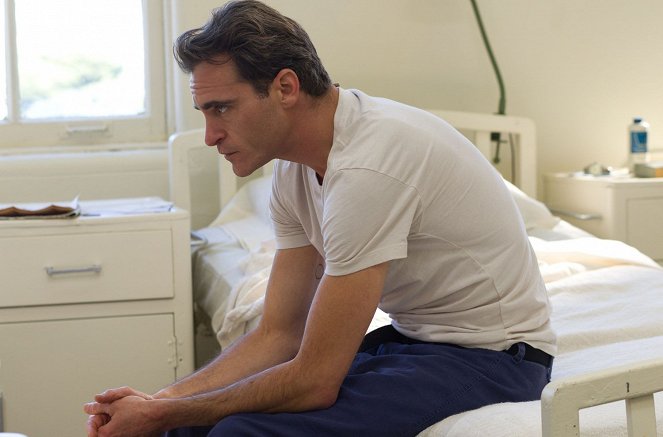Réalisation:
Paul Thomas AndersonScénario:
Paul Thomas AndersonPhotographie:
Mihai Malaimare Jr.Musique:
Jonny GreenwoodActeurs·trices:
Joaquin Phoenix, Philip Seymour Hoffman, Amy Adams, Laura Dern, Ambyr Childers, Rami Malek, Jesse Plemons, Kevin J. O'Connor (plus)VOD (1)
Résumés(1)
THE MASTER, le nouveau film de Paul Thomas Anderson, est un portrait saisissant d'êtres à la dérive, en quête de sens, dans l'Amérique d'après-guerre. Freddie, un vétéran, revient en Californie après s'être battu dans le Pacifique. Alcoolique, il distille sa propre gnôle et contient difficilement la violence qu'il a en lui... Quand Freddie rencontre Lancaster Dodd – « le Maître », charismatique meneur d'un mouvement nommé la Cause, il tombe rapidement sous sa coupe... (Metropolitan FilmExport)
(plus)Vidéo (13)
Critiques (7)
When it ended, this thoughtfully “non-didactic” film left me in exactly the opposite state of mind as Django Unchained – drained, helpless, empty. I don’t know – and maybe I don’t even want to know – how much Joaquin Phoenix, as a lunatic without a cause, owes his acting performance to the directing and how much to his own psychopathy, but the fact remains that I have not seen anyone perform with such self-destructive dedication in a long time. This may be because so many contemporary directors let actors perform solely with their faces, fewer with the rest of their bodies. Even if I got nothing else out of The Master, it would deserve my five-star rating solely for the performances of Phoenix and Hoffman (who obviously has more control over his acting than his co-star does). ___ However, Paul Thomas Anderson’s least viewer-friendly film to date is stimulating on many other levels, whether that refers to style (long, increasingly unbalanced shots that leave how we approach them up to us) or meaning (the unending search for a leader, the obsessive need for a goal). In conflict with their usual purpose, the long shots with great depth of field do not contribute to greater transparency but, on the contrary, to the feeling of being imprisoned in a universe that is outwardly real yet bizarre in the manner of David Lynch’s films. In a similarly ironic way, the “epic” 70 mm format is repeatedly used for large close-ups of faces, which sprawl across the entire screen as if they were landscapes that Anderson wants to traverse. ___ It seems to me that the crisis of masculinity and the issue of men with empty lives and no clear goals were last addressed in a comparably suggestive way in the films of the Hollywood Renaissance (Five Easy Pieces, The Long Goodbye, Fingers). Anderson, however, takes the issue even further as he makes the search for the roots of this frustration and the strangest ways to overcome it the central theme of the film. He places the unmotivated (non-)hero in the context of a post-war American society longing to return to a status quo that no longer existed. The unsatisfying narrative, with its many deliberate holes and dead spots, is completely subordinate to this desperate search for a clue. Like Freddie in the almost parodic scene in the desert (when heading for a non-existent destination is turned into a fun activity), the film also heads toward a barely visible point somewhere in the distance. And just as Freddie blindly (literally in places) follows Dodd in the belief that he is the true master, the one who could personify his ideal self (see the party scene, which perhaps references the nudie-cutie films of the 1950s), we can also believe that we know where the film is headed. However, there is no master who would confirm or refute our assumptions. Anderson lets the viewer take the lead, thus warning against the susceptibility of a person in any crisis to look for tried-and-tested ways out of their predicament, while also contributing to the considerable variability of the resulting viewer experience. Regarding my own experience with the film, I can write with certainty that it was not pleasant and that I want to repeat it. 90%
()
(moins)
(plus)
It’s been a long time since I’ve been this uncertain and hit out of nowhere as I was in this movie. One thing I know for sure, no one today films like PTA, and few dare to uncompromisingly combine enigmatic fragments and explicit meanings. The Master is a film-psychosis, and even more than There Will Be Blood, it bets on crazy and enchanting characters, whose destinies are described in one great film anacoluthon. Two and a half hours of hints, fragments, vagueness, frustrating volatilization between affect and manipulation, anger and apathy, two and a half hours of deliberate hopelessness, extreme strangeness of words, things and people, but at the same time completely masterful control over each image and the whole. The bond of master and disciple with all hidden and obvious vibrations, an analytical view of spiritual manipulation, a raw image of human desire for meaning and fulfillment, achieving balance through the one who "knows", coldness, virtuosity, at the same time strong doubts whether the whole is not overly calculated, ostentatiously mysterious... a film I "don't want" to see again. "I have to". That doesn't happen to me often. The Master, not Holy Motors, is the strangest film of the year for me. [closed screening] Edit: What I miss about the film is the whole - PTA intentionally does not leave the phase of endless excess and bouts of psychosis. Although some fragments are divine and the character of Freddie's masterpiece (the acting and screenwriting), the film as such does not create a monumental unity like There Will Be Blood - it is a fragmentary image of futile searching, unattainable desire and inner ambivalence - to find who makes sense to us, and to be someone who has no master. The answer to how many topics The Master opens is actually banally simple - a woman made of sand. Maybe that's why the unsettling fact that Daniel Plainview and Eli Sunday cannot be classified is missing. Although the film works in part enigmatically (it does not provide clear motivations and answers to the main character's questioning), it is not the kind of code that draws in, but rather terribly confident flashy authorial gestures (this film has two masters: the character Amy Adams and the director). While There Will Be Blood can be taken as a disturbing metaphor for man, power, faith, and capitalism, The Master is a locked, obscure, yet beautiful structure of a creator who seems to be overly subject to the exclusivity of his visions. And it arouses the kind of frustration without which one cannot think and exist. [85%]
()
The Master is a weird movie. This was the first thing that came to mind when I was watching the movie and even after I finished it. I was actually feeling a bit weird when I was getting ready to see it, but Joaquin Phoenix was the very reason why I wanted to see the movie. And the result is that Joaquin put in another of his absolutely brutal acting performances with which I only had one problem. I didn’t understand his character at all. You see I don’t think I have ever seen such a psychologically disturbed character in my life. I had no idea what he would do the next minute, which was actually a good thing and he definitely convinced me of what a precise actor he is and that he is willing to do anything for the role. I tip my hat off to him. And naturally I shouldn’t forget about Hoffman, who definitely wasn’t bad, but the whole thing takes place in this strange time in the 1950’s. People behave really strangely, and the whole atmosphere is really strange as well, and what you’re dealing with could be considered a cult. A really strange movie. It’s really hard to form any deeper opinion about it. Let me just add that the music in the movie made me feel really uneasy, which I guess was the point, but it’s also one of the reasons why I cannot go higher than three stars.
()
I resign myself and will try to take a clear stand on this film after watching it once. Phoenix and Hoffman are amazing, and technically, the film is brilliant. It’s nice to see every now and again in the cinema something different from other Hollywood productions, and The Master is really very, very different; so different that, I must say, it gets a little frustrating. Adding a pinch of classic storytelling would make it a lot more viewer-friendly and the art onanists would still be satisfied. Two assholes behaving like assholes, doing asshole things and talking about asshole things for two and a half hours, without that leading to anything very interesting; it’s missing a catharsis. Rather than confirming its status as an exceptional movie experience, the ending just fades away. But it would be good to watch it one more time – though I don’t really want to…
()
Fascinating interaction of two remarkable, yet equally enormous personalities. Not for the first time, Paul Thomas Anderson tells the story in a rhythm that doesn't quite resonate with me, but the main duo puts in so much effort that I sometimes struggle to handle the resulting emotions. The central theme both charges and unsettles me, making The Master an extremely intense spectacle, albeit in a somewhat unpleasant and unfamiliar way.
()


